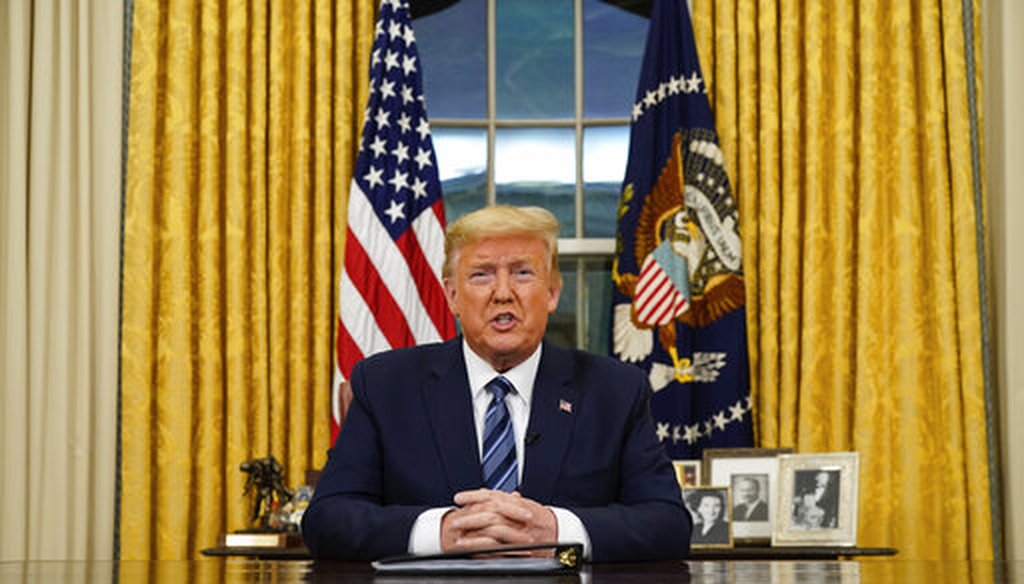Stand up for the facts!
Our only agenda is to publish the truth so you can be an informed participant in democracy.
We need your help.
I would like to contribute

President Donald Trump speaks in an address to the nation from the Oval Office at the White House about the coronavirus, March, 11, 2020, in Washington. (Doug Mills/The New York Times via AP, Pool)
If Your Time is short
-
All travel from Europe is not suspended. The ban doesn’t cover all of Europe and has numerous exemptions.
-
Goods and cargo can still come in from Europe, despite Trump’s contrary remark.
-
U.S. citizens, lawful permanent residents and their relatives can still come in.
President Donald Trump announced a sweeping ban on travel from Europe as a way to keep new cases of the coronavirus disease "from entering our shores."
But details from the White House and a proclamation he signed showed that his March 11 primetime address included inaccuracies and significant omissions.
RELATED: Trump wrongly said insurance companies will waive co-pays for coronavirus treatments
"We will be suspending all travel from Europe to the United States for the next 30 days."
This is misleading. The ban doesn’t cover all of Europe and has numerous exemptions.
The ban applies to countries in the "Schengen Area" — a designation for a group of European states part to an agreement allowing free movement among their nations without border checks. Most nations in the European Union are part of the Schengen Area.
Sign up for PolitiFact texts
Countries covered in the ban include: Austria, Belgium, Czech Republic, Denmark, Estonia, Finland, France, Germany, Greece, Hungary, Iceland, Italy, Latvia, Liechtenstein, Lithuania, Luxembourg, Malta, Netherlands, Norway, Poland, Portugal, Slovakia, Slovenia, Spain, Sweden, and Switzerland.
Trump’s proclamation had more details. It said the ban was for people seeking entry as immigrants or nonimmigrants and who were "physically present within the Schengen Area during the 14-day period preceding their entry or attempted entry into the United States."
The immigrant category applies to people who intend to live permanently in the United States; the nonimmigrant category includes people who want to come temporarily, such as tourists.
Still, the proclamation listed categories of people who could come in despite the ban. For instance, the ban does not apply to people who, based on the discretion of top U.S. health officials, "would not pose a significant risk of introducing, transmitting, or spreading the virus."
Foreign government officials and their immediate family members and people seeking entry as employees of a designated international organization or NATO are also among those exempt from the ban.
As Trump said in his address, the United Kingdom — comprised of England, Scotland, Wales and Northern Ireland — is also exempt from the ban. He didn’t mention the Republic of Ireland in his speech, but as a non-Schengen country Ireland is exempt as well.
Whether the ban lasts 30 days is uncertain. The proclamation says the ban will remain in effect until Trump decides otherwise. The Health and Human Services secretary is expected to make recommendations to the president going forward.
For clarity, the proclamation said the ban would go into effect at "11:59 p.m. eastern daylight time on March 13."
"There will be exemptions for Americans who have undergone appropriate screenings."
This falsely made it sound as if some Americans would not be allowed back into the country. U.S. citizens, lawful permanent residents, and their spouses are not banned from coming to the United States.
Others allowed in include: non-U.S. citizen parents of unmarried U.S. citizens and lawful permanent residents under 21 years old; siblings of U.S. citizens and lawful permanent residents if both are unmarried and under the age of 21; children, foster children or wards of U.S. citizens and lawful permanent residents, or a prospective adoptee seeking entry under certain visas; and members of the U.S. Armed Forces, their spouses and children.
People exempt from the ban will be directed to a limited number of airports where they can be screened.
"These prohibitions will not only apply to the tremendous amount of trade and cargo, but various other things as we get approval. Anything coming from Europe to the United States is what we are discussing."
This is directly contradicted by the proclamation, a White House fact-sheet, and a tweet from Trump after his address. Goods and cargo can still come in from Europe.
The proclamation said that "the free flow of commerce between the United States and the Schengen Area countries remains an economic priority" and that Trump remained "committed to facilitating trade between our nations."
After speaking, Trump tweeted: "The restriction stops people not goods."
Emily Venezky contributed research to this report.
Our Sources
YouTube, The White House - Trump address on coronavirus, March 11, 2020
White House fact-sheet, President Donald J. Trump Has Taken Unprecedented Steps To Respond To The Coronavirus And Protect The Health And Safety Of Americans, March 11, 2020; Proclamation—Suspension of Entry as Immigrants and Nonimmigrants of Certain Additional Persons Who Pose a Risk of Transmitting 2019 Novel Coronavirus, March 11, 2020
Twitter, @realdonaldtrump tweet, March 11, 2020
U.S. State Department, Directory of Visa Categories, accessed March 12, 2020
European Union website, Schengen Area








































